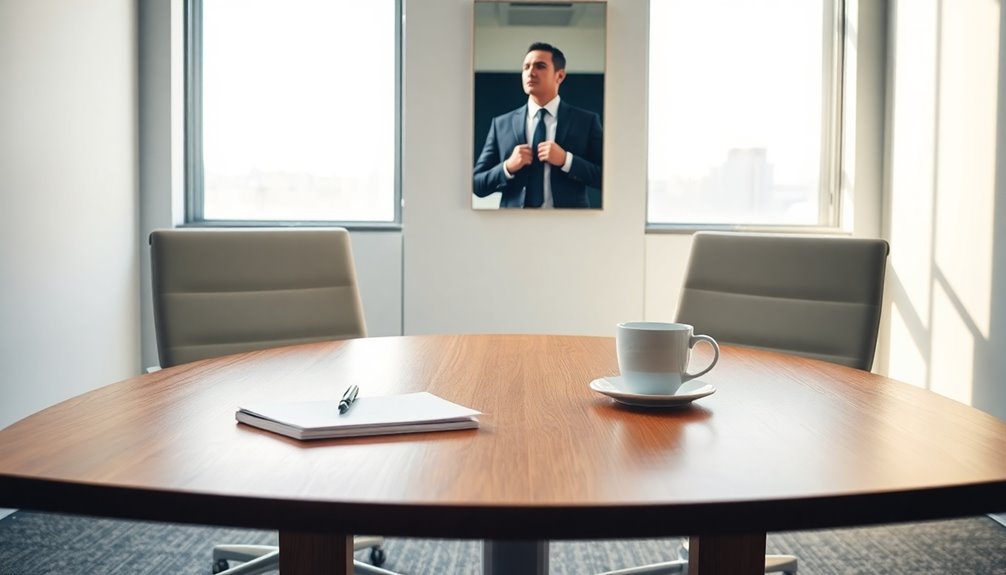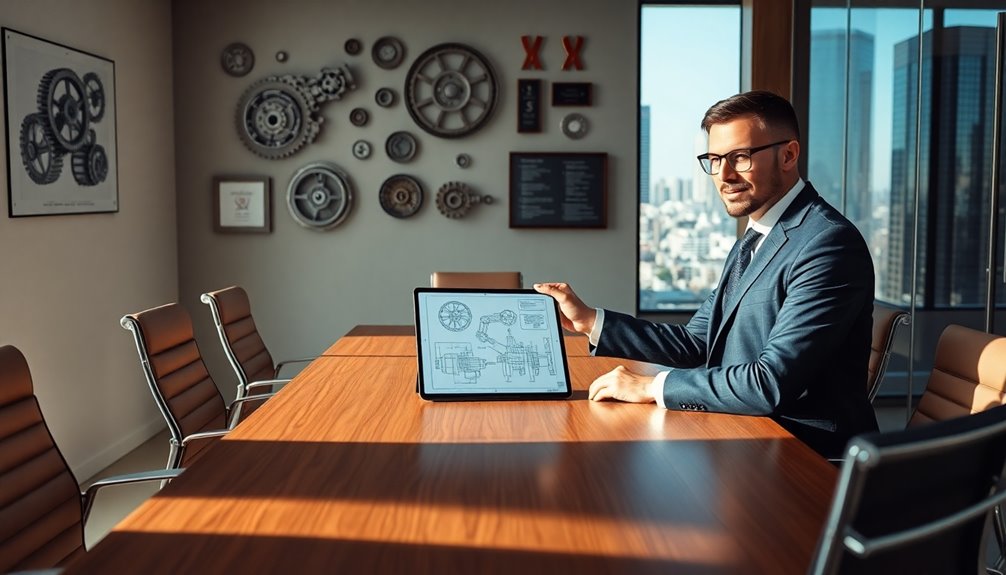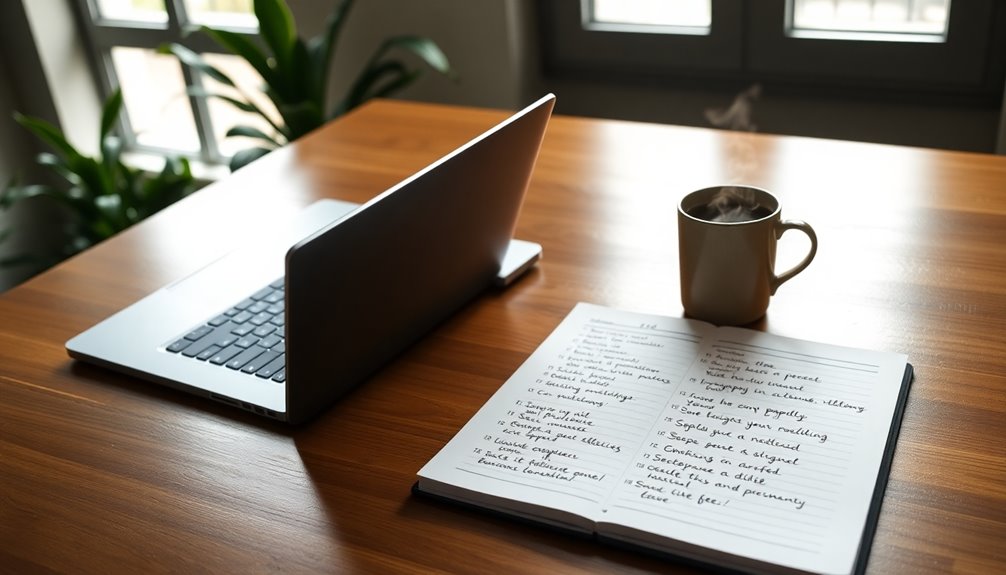Nailing your police interview takes focused preparation and understanding. Start by researching common questions and using the STAR method for clear answers. Align your responses with the department's values to show commitment. Showcase your qualifications, emphasizing relevant skills like conflict resolution and crisis management. Don't underestimate the power of interpersonal skills; active listening and adaptability go a long way. When faced with scenario questions, pause, reflect, and draw from past experiences. By managing expectations and avoiding common pitfalls, you increase your chances of success. Keep going to uncover more expert insights that can further enhance your performance.
Key Takeaways
- Research common police interview questions and prepare structured responses using the STAR method for clarity and impact.
- Highlight relevant skills like conflict resolution, crisis management, and community service commitment to showcase your qualifications.
- Practice active listening and adapt your communication style to build rapport with interviewers and demonstrate interpersonal skills.
- Be honest about your strengths and weaknesses, aligning them with the department's values to show commitment to the profession.
- Use past experiences to illustrate how you handled similar scenarios, emphasizing adaptability and thoughtfulness in your responses.
Understanding Interview Questions

When preparing for your police interview, it's crucial to break down and understand the questions you'll likely face.
You'll encounter general questions about your background, motivations, and self-perception. These queries help the panel gauge your suitability for the role and your understanding of the law enforcement field.
Expect inquiries about your strengths, weaknesses, and reasons for moving into law enforcement. Knowing your career inspirations and how you view past failures can also come into play.
Recognizing the importance of each question will allow you to tailor your responses effectively. You'll want to demonstrate your commitment to the profession while aligning your values with the department's goals.
This preparation sets the foundation for a successful interview experience.
Preparing Your Responses

Crafting effective responses for your police interview is essential to making a strong impression. Start by researching common interview questions and preparing thoughtful answers. Tailor your responses to reflect your experiences, emphasizing relevant skills and lessons learned.
Use the STAR method—Situation, Task, Action, Result—to structure your answers, providing clear examples that demonstrate your capabilities. Practice speaking your responses out loud to guarantee clarity and confidence.
Remember to align your answers with the department's values and goals, showing that you understand and respect their mission. Finally, be honest about your strengths and weaknesses, and avoid vague statements.
This preparation will help you present yourself as a capable candidate ready to contribute positively to the force. Additionally, developing a mindset that embraces challenges as opportunities will enhance your resilience and adaptability during the interview process.
Showcasing Personal Qualifications

Showcasing your personal qualifications is essential for standing out in a police interview. Highlight your skills and experiences that align with the role. Be specific about what you bring to the table.
Here are three key areas to focus on:
- Relevant Skills: Emphasize your knowledge of the law, conflict resolution, and crisis management.
- Work Ethic: Demonstrate your attention to detail and commitment to serving the community effectively.
- Academic Achievements: Mention any training or certifications that bolster your credibility in law enforcement.
Mastering Interpersonal Skills

How can you effectively connect with diverse personalities in a police setting? Start by practicing active listening. Show genuine interest in what others say, and respond thoughtfully. This builds trust and rapport.
Adapt your communication style; some may prefer directness, while others appreciate a more nuanced approach. Embrace collaboration, valuing each team member's perspective.
When conflicts arise, approach them with a positive attitude, focusing on compromise and resolution. Don't shy away from civil discussions, even when disagreements occur.
Be open to learning from colleagues with different backgrounds; it can enrich your understanding. Finally, maintain a respectful demeanor, ensuring everyone feels valued.
Mastering these interpersonal skills won't only enhance your teamwork but also positively impact your effectiveness in law enforcement.
Navigating Scenario Questions

Building strong interpersonal skills is essential for effective teamwork, and this same principle applies when managing scenario questions during your police interview.
When faced with hypothetical situations, approach your responses thoughtfully. Here are some strategies to navigate these questions:
- Pause to reflect: Take a moment to gather your thoughts before responding. This shows you're considerate and thorough.
- Ask for clarification: If a scenario's unclear, don't hesitate to ask for more details. It demonstrates your commitment to understanding the situation fully.
- Be adaptable: Each scenario may require a different approach. Showcase your flexibility and ability to think on your feet.
Managing Interview Expectations

Understanding interview expectations is essential for your success in the police interview process.
You'll likely face a range of questions that explore your personal and professional background, motivations, and experiences in law enforcement. Anticipate panel interviews, where multiple department members may ask questions, making it vital to engage with each participant.
Expect interviews to last between 15 to 20 minutes, but be prepared for variations based on the conversation flow. Familiarize yourself with the types of questions you might encounter, such as those about stress management and conflict resolution.
Thorough preparation can help you feel more confident and at ease, allowing you to present your best self during this important opportunity.
Avoiding Common Pitfalls

Maneuvering a police interview can be challenging, and avoiding common pitfalls is key to making a positive impression.
To stand out, you'll want to focus on being specific and honest in your responses. Here are some common traps to avoid:
- Don't give vague or generic answers; use concrete examples to illustrate your points.
- Be honest about your strengths and weaknesses; it shows self-awareness and integrity.
- Avoid negative comments about previous employers; maintain a professional tone throughout.
Engaging With Follow-Up Questions

Engaging in a productive dialogue during your police interview can set you apart from other candidates. Follow-up questions show your interest and help clarify key points. Prepare thoughtful inquiries that reflect your knowledge about the department and its values. This not only demonstrates your engagement but also provides you with essential information about the role.
| Type of Question | Example |
|---|---|
| Department Culture | "How would you describe the team dynamic?" |
| Training Opportunities | "What training programs does the department offer?" |
| Community Engagement | "How does the department collaborate with the community?" |
| Advancement Potential | "What does a typical career path look like here?" |
| Hiring Process | "What are the next steps after today's interview?" |
Frequently Asked Questions
What Should I Wear to a Police Interview?
When you're preparing for a police interview, you should wear professional attire that conveys respect and seriousness.
A well-fitted suit or dress pants with a collared shirt is ideal. Avoid overly casual clothing like jeans or t-shirts.
Make sure your shoes are polished and appropriate. You want to present yourself as someone who takes the role seriously and understands the importance of first impressions in law enforcement.
Confidence in your appearance can boost your performance.
How Do I Research a Specific Police Department?
To research a specific police department, start by visiting their official website.
Look for information about their mission, values, and community programs.
Check social media pages for updates and community interactions.
Read local news articles to understand recent events and issues they've faced.
You can also connect with current or former officers to gain insights.
This knowledge will help you understand their culture and priorities, making you a stronger candidate.
What Is the Typical Interview Format for Police Positions?
A police interview's like a rollercoaster ride—full of twists and turns.
Typically, you'll face a mix of personal and professional questions, often in a panel format. Expect 15 to 20 minutes of dialogue, where your responses reveal your character and suitability.
You'll also encounter scenario-based questions to assess your decision-making skills. Staying calm and prepared will help you navigate smoothly through this thrilling experience.
How Important Is Body Language During the Interview?
Body language plays an essential role in your interview. It can convey confidence, openness, and professionalism, helping the interviewer gauge your suitability.
When you maintain eye contact, sit up straight, and use positive gestures, you demonstrate engagement and assertiveness. Avoid crossing your arms or fidgeting, as these can signal discomfort or defensiveness.
Being aware of your non-verbal cues can greatly enhance the impression you leave, so practice and refine your body language beforehand.
Should I Bring Anything to the Interview?
Did you know that 55% of communication is non-verbal?
When heading to your interview, you should bring a few key items. First, carry multiple copies of your resume to share with interviewers. A notepad and pen are great for jotting down important points.
If applicable, bring certifications or documents that showcase your qualifications.
Finally, don't forget to bring your positive attitude and confidence—it'll set the right tone for the conversation!
Conclusion
You might think the police interview process is intimidating, but it doesn't have to be. With the right preparation and mindset, you can approach it as an opportunity to showcase your unique qualifications and passion for community safety. Remember, every question is a chance to share your story and demonstrate your commitment. By applying these expert tips, you'll not only navigate the interview with confidence but also leave a lasting impression on the panel. You've got this!









